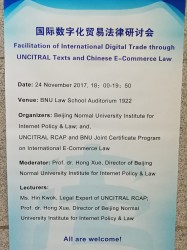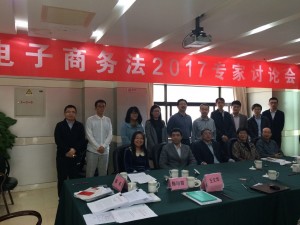November 30, 2017 at 3:30 pm
· Filed under Archives, Conferences, JCP: Joint Certificate Program on International E-Commerce Law, Legal News


Along with other six distinguishing universities in AP region, BNU IIPL & UNCITRAL-BNU JCP jointly organized the Public Lecture on “Facilitation of International Digital Trade through UNCITRAL Texts and Chinese E-Commerce Law” on 24 November 2017 at BNU Law School Auditorium To memorize 2017 UNCITRAL Asia Pacific Day. The lecture is supported by UNCITRAL Regional Center for Asia and the Pacific (RCAP).
Organizers: Beijing Normal University Institute for Internet Policy & Law; and, UNCITRAL RCAP and BNU Joint Certificate Program on International E-Commerce Law
Moderator: Prof. dr. Hong Xue, Director of Beijing Normal University Institute for Internet Policy & Law
Lecturers: Ms. Hin Kwok, Legal Expert of UNCITRAL RCAP;
Prof. dr. Hong Xue, Director of Beijing Normal University Institute for Internet Policy & Law
More 30 LLM, JM and PhD students from China, Belgium, Italy, Pakistan, Togo and other countries joined the Public Lecture and had the active interactive discussion with the lecturers.

2017年11月24日星期五晚,北京师范大学互联网政策与法律研究中心(IIPL)主办的国际数字化贸易法律研讨会在后主楼1922会议报告厅举办。本次会议是为了纪念联合国国际贸易法委员会亚太日,日本、澳大利亚、印度、中国香港等六所知名大学也在同一时间举办了纪念活动。本次活动由北京师范大学互联网政策与法律研究中心主任薛虹教授现场主持,联合国国际贸易法委员会亚太中心法律专家郭轩女士(Ms. Hin Kwok)作为嘉宾出席并讲话,共同参加这次学习、研讨的还有来自法学院的研究生以及中国法硕士生及其他留学生与访问、交换生。会议开始,首先由薛虹教授介绍了联合国国际贸易法委员会亚太中心与北京师范大学国际电子商务法联合认证项目的发展历程以及发展成果,并介绍了此次会议的目的是学习并讨论联合国国际贸易法委员会关于国际数字化贸易立法的经验。 随后出席会议的Ms. Hin Kwok专家介绍了联合国国际贸易法委员会,并围绕电子商务立法经验、电子交易法基础原则、电子通信公约、电子交易记录示范法以及发展前景等做了详细的阐述。接下来,薛虹教授结合国际社会数字化贸易中立法司法实践中取得的进展及经验,探讨了当前中国电子商务法立法中的困难以及发展方向。在研讨会的最后环节,在场的同学们与Ms. Hin Kwok专家和薛虹教授展开了激烈的讨论,研讨会气氛热烈。研讨会结束后,薛虹教授代表法学院向Ms. Hin Kwok专辑赠送了法学院纪念品,并与会成员进行合照,本次大会圆满结束。

Permalink
November 15, 2017 at 5:39 pm
· Filed under Archives, Conferences, Internet Governance, Legal News
![IMG_0484[1]](http://wiki.iipl.org.cn/wp-content/uploads/2017/12/IMG_04841-300x225.jpg) The withdrawal of the United States from the Trans-Pacific Partnership (TPP) process, and the current deep freeze of U.S.-EU negotiations on a Trans-Atlantic Trade and Investment Partnership (TTIP) has generated gaps in plurilateral efforts to promote the Digital Economy through targeted policy initiatives and regional commercial frameworks. It has become difficult to address emerging digital challenges in areas like privacy and intellectual property in key economic sectors such as healthcare, financial services, and government procurement despite agreement among all parties that measures to support the cross-border flow of data are central to economic growth and innovation.
The withdrawal of the United States from the Trans-Pacific Partnership (TPP) process, and the current deep freeze of U.S.-EU negotiations on a Trans-Atlantic Trade and Investment Partnership (TTIP) has generated gaps in plurilateral efforts to promote the Digital Economy through targeted policy initiatives and regional commercial frameworks. It has become difficult to address emerging digital challenges in areas like privacy and intellectual property in key economic sectors such as healthcare, financial services, and government procurement despite agreement among all parties that measures to support the cross-border flow of data are central to economic growth and innovation.
A related objective of this first dialogue held in Washington DC on November 6-7, 2017, co-organized by Asia and Europe Dialogue on Growing the Digital Economy and John Hopkins University SAIS Center for Transatlantic Relations was to mobilize a network of academic experts on the Digital Economy across Europe and Asia. Improved and sustained interaction among the scholarly, business, government, and NGO communities is likely to contribute to the development of sound policies supportive of growth and continued innovation in digital markets. Prof. Xue took part in the Dialogue and chaired the Session I: Moving from an “Internet” to a “Digital” Economy and gave a keynote in Session V: Managing Transformative Digital Technologies.
As stated by Prof. Xue, more than 800 million Chinese are online. China boasts the largest online consumer market and is second only to the United States in the size of its B2B online commerce. Malaysia’s Central Bank has just introduced guidelines for mobile payments and the country is among the largest centers for data processing globally. Japan is investing heavily in next generation technologies, prominently AI and robotics. The Republic of Korea boasts global industry leaders, such as Samsung and Naver. India has also fully embraced the potential of the Digital Economy. A recent example is the government’s push to reduce the amount of paper money in circulation and grow the digital payments space.
Yet overall the Asia-Pacific region is less connected digitally among its constituent parts, and less connected to North America and Europe than the other two regions are connected to each other. Europe has the largest share of interregional data flows of all regions, and is pushing international norms on a series of issues related to the digital economy that could have significant repercussions in the Asia-Pacific region. European companies account for 21% of Internet of Things (IoT) companies globally, compared to a 5% share for Chinese and Japanese companies. European companies account for 32% of big data companies globally, compared to 6% for Chinese and Indian companies and 2% for Japanese and Korean companies. Yet Europe suffers problems of fragmentation, scale, and divisions between “network-ready” western and northern Europe and less-ready countries in southern and eastern Europe.
Asia-Pacific views on the Digital Economy are rooted more in an economic imperative than a social perspective. There are also significant implications flowing from the EU’s view of data protection as a fundamental human right in sharp contrast to China’s view of data security as a fundamental state right. The General Data Protection Regulation (GDPR), to be implemented by the EU in May 2018, has sparked deep concerns across the Asia-Pacific region regarding regulatory costs, market access and the impact on innovation and growth. European views on privacy and Asian concerns about the extent to which such views may be pushed via regulation might be addressed in part, but not fully, through better technology. National and regional regulation needs to be grounded in how the technology actually operates. The diversity in approaches to the management of data seen in Asia may be more functional than the conformity demanded by the European approach. “Adequacy” provisions are moving forward between the EU and Japan, and most likely between the EU and the Republic of Korea, with uncertain implications for other Asia-Pacific countries or broader international norms.
The event helped to frame and energize a dialogue between Asian and European scholars with the goal of supporting parallel discussions in government and private sector policy circles on the tools and processes essential to the management and growth of the Digital Economy. The outcomes from this meeting will be further developed at subsequent sessions planned for Tokyo (Spring 2018) and Brussels (Fall 2018).
Permalink
November 1, 2017 at 8:20 pm
· Filed under Archives, Conferences, JCP: Joint Certificate Program on International E-Commerce Law, Legal News
 《中华人民共和国电子商务法(草案)》(简称草案)于2016年12月25日提交全国人大常委会首次审议,十二届全国人大常委会第三十次会议于2017年10月31日对“电子商务法草案”进行了第二次审议。 本着遵循规范经营与促进发展并重、聚焦于规范电子商务经营者特别是平台经营者、按照“鼓励创新、包容审慎”的原则,二次审议稿草案规定,电子商务经营者应当依法办理工商登记,但销售自产农副产品、销售家庭手工业产品、个人利用自己的技能从事依法无须取得许可的便民劳务活动以及依照法律、行政法规不需要进行工商登记的除外。 电子商务经营者是否需要依法办理工商登记,一直是社会讨论的焦点话题,有意见认为,应当促进电子商务经营的发展,扩大免于工商登记的范围。但也有意见认为,工商登记是税收征管的基础,而且工商登记、税务登记已合并,实行一照一码,工商登记应当线上线下统一。全国人大法律委员会研究后,对免于工商登记的范围作了修改。草案着重对加强消费者权益保护进行了修改和完善,规定不得以虚假宣传、虚构交易、编造用户评价等方式侵害消费者的知情权,应当明示用户注销的方式和程序,对于竞价排名的商品或者服务,应当显著标明“广告”。同时,草案还规定,电子商务平台不得利用服务协议和交易规则等手段,对平台内经营者的交易、交易价格等进行不合理限制或者附加不合理交易条件,或者收取不合理费用。此外,草案还完善了电子商务争议处理规范,经营者应当提供原始合同和交易记录,丢失、伪造、篡改、隐匿或拒绝提供的,应当承担相应责任。预计《电子商务法》将于2018年3月两会期间第三次审议并通过。
《中华人民共和国电子商务法(草案)》(简称草案)于2016年12月25日提交全国人大常委会首次审议,十二届全国人大常委会第三十次会议于2017年10月31日对“电子商务法草案”进行了第二次审议。 本着遵循规范经营与促进发展并重、聚焦于规范电子商务经营者特别是平台经营者、按照“鼓励创新、包容审慎”的原则,二次审议稿草案规定,电子商务经营者应当依法办理工商登记,但销售自产农副产品、销售家庭手工业产品、个人利用自己的技能从事依法无须取得许可的便民劳务活动以及依照法律、行政法规不需要进行工商登记的除外。 电子商务经营者是否需要依法办理工商登记,一直是社会讨论的焦点话题,有意见认为,应当促进电子商务经营的发展,扩大免于工商登记的范围。但也有意见认为,工商登记是税收征管的基础,而且工商登记、税务登记已合并,实行一照一码,工商登记应当线上线下统一。全国人大法律委员会研究后,对免于工商登记的范围作了修改。草案着重对加强消费者权益保护进行了修改和完善,规定不得以虚假宣传、虚构交易、编造用户评价等方式侵害消费者的知情权,应当明示用户注销的方式和程序,对于竞价排名的商品或者服务,应当显著标明“广告”。同时,草案还规定,电子商务平台不得利用服务协议和交易规则等手段,对平台内经营者的交易、交易价格等进行不合理限制或者附加不合理交易条件,或者收取不合理费用。此外,草案还完善了电子商务争议处理规范,经营者应当提供原始合同和交易记录,丢失、伪造、篡改、隐匿或拒绝提供的,应当承担相应责任。预计《电子商务法》将于2018年3月两会期间第三次审议并通过。
参与草案起草工作的北京师范大学互联网法律与政策研究中心主任薛虹于12月23日向中新社记者表示,该草案是世界首部综合性的电子商务法案,有望引领此领域的立法潮流。联合国于1996年12月16日出台首部《电子商务示范法》(UNCITRAL Model Law on Electronic Commerce),世界电子商务立法迎来“破冰”。“该法堪称电子商务立法的‘1.0版本’”,薛虹说。此后,欧美主要经济体都照此制定了类似法律,可以称为“2.0版本”。时隔20年,世界电子商务的发展与之前已经不能同日而语,中国在此领域的发展也已经达到全球前列高度。“中国根据新的变化和要求进行立法,有望成为世界电子商务立法的‘3.0版本’,起到示范作用”,薛虹说。
她认为,从国际视角来看,草案主要有三方面特点。一是全面吸收借鉴了全球电子商务立法的经验,并体现了中国立法的“原创智慧”。如草案赋予了第三方电子商务平台法律地位,并创造性地规范与监管电子商务平台的信用管理机制、在跨境电子商务综合服务者方面设立相关规定。“这都是世界现有法律没有的,体现了中国立法的原创性”,薛虹说。
二是在草案中,中方明确了愿意参与构建相关国际法律的态度。如草案第七十三条规定,国家推动建立与不同国家、地区间跨境电子商务的交流合作,参与电子商务国际规则的制定。薛虹说,这从立法领域体现出中国的开放态度,中国今后在电子商务领域将更深度融入世界。
三是目前看,中国电子商务法草案是世界此领域首部综合性立法,对于其他国家尤其是发展中国家的立法起到积极的示范作用。薛虹表示,经过20年的发展,世界上主流国家对于电子商务的规范还停留在一些分门别类的条款中,如有的单独对电子交易进行规范、有的单独对交易平台进行规范。“而中国在立法之初,就将与电子商务有关的领域都考虑进去,是立法体例的创新。”
草案对与电子商务有关的领域都作出了规范,如电子支付、快递物流等内容都被纳入其中,并在争议解决、市场秩序与公平竞争、知识产权保护、个人信息保护等方面作出了相关规定。
薛虹说,此次在立法过程中,起草组充分听取各方意见,先后召开两次国际研讨会,并将草案翻译成英文,邀请联合国国际贸易法委员会和美国、欧盟、日本、新加坡等国专家进行研讨,在此基础上进行丰富和修改。
“草案英文版公布后在一些国家引起了强烈反响”,薛虹说,许多发展中国家的专家看过后表示,现在要学习的不再是20年前的联合国示范法,而是要学习中国的做法。“这也是中国对于全球电子商务立法的主要贡献。”
中新社北京12月23日电 (记者 梁晓辉) http://www.chinanews.com/gn/2016/12-23/8102740.shtml
网易财经 http://money.163.com/16/1223/11/C8VGTTTL00254TI5.html#from=keyscan
东方头条 http://mini.eastday.com/a/161223114952654-2.html
法制网 http://www.legaldaily.com.cn/index/content/2016-12/27/content_6932482.htm?node=20908
Permalink




![IMG_0484[1]](http://wiki.iipl.org.cn/wp-content/uploads/2017/12/IMG_04841-300x225.jpg)
